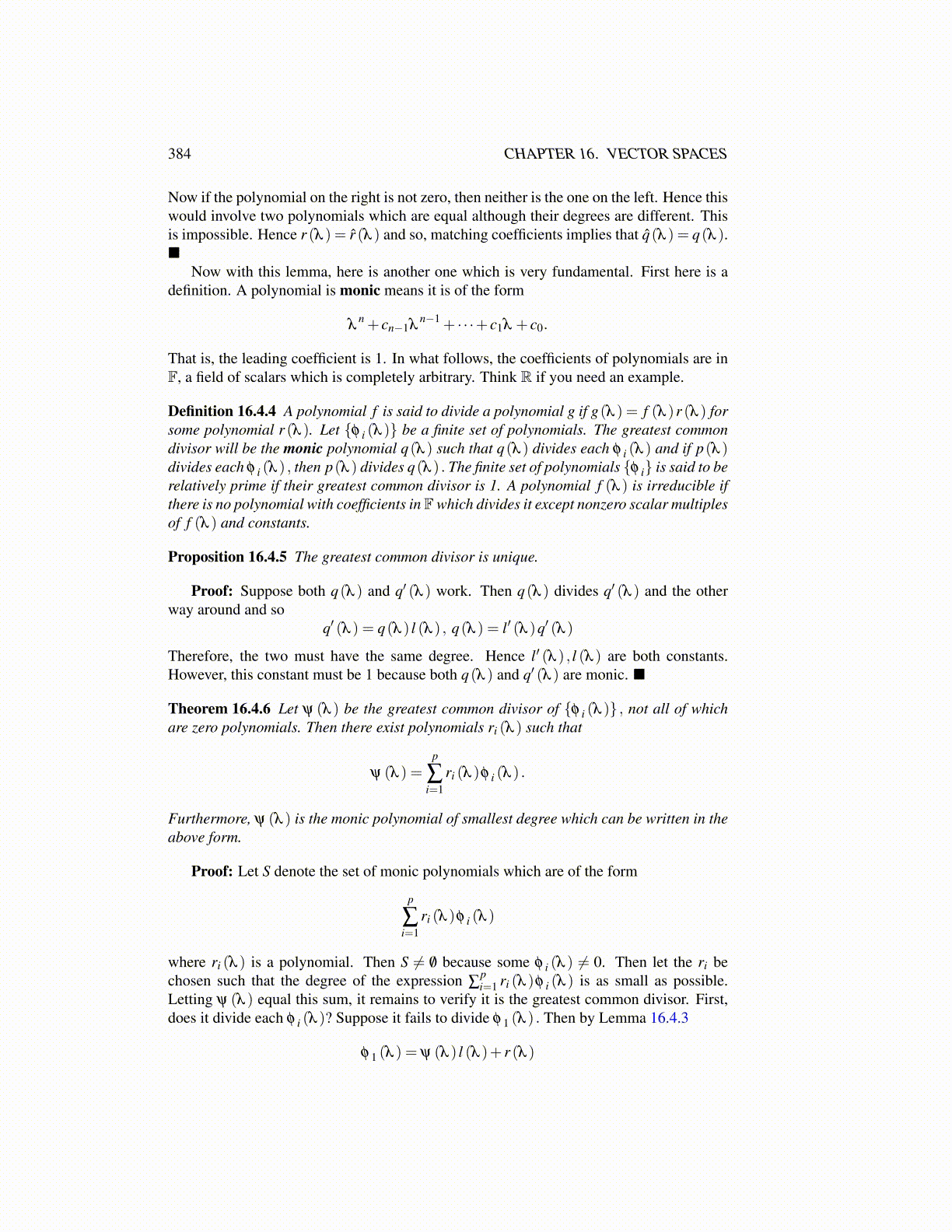
384 CHAPTER 16. VECTOR SPACES
Now if the polynomial on the right is not zero, then neither is the one on the left. Hence thiswould involve two polynomials which are equal although their degrees are different. Thisis impossible. Hence r (λ ) = r̂ (λ ) and so, matching coefficients implies that q̂(λ ) = q(λ ).■
Now with this lemma, here is another one which is very fundamental. First here is adefinition. A polynomial is monic means it is of the form
λn + cn−1λ
n−1 + · · ·+ c1λ + c0.
That is, the leading coefficient is 1. In what follows, the coefficients of polynomials are inF, a field of scalars which is completely arbitrary. Think R if you need an example.
Definition 16.4.4 A polynomial f is said to divide a polynomial g if g(λ ) = f (λ )r (λ ) forsome polynomial r (λ ). Let {φ i (λ )} be a finite set of polynomials. The greatest commondivisor will be the monic polynomial q(λ ) such that q(λ ) divides each φ i (λ ) and if p(λ )divides each φ i (λ ) , then p(λ ) divides q(λ ) . The finite set of polynomials {φ i} is said to berelatively prime if their greatest common divisor is 1. A polynomial f (λ ) is irreducible ifthere is no polynomial with coefficients in F which divides it except nonzero scalar multiplesof f (λ ) and constants.
Proposition 16.4.5 The greatest common divisor is unique.
Proof: Suppose both q(λ ) and q′ (λ ) work. Then q(λ ) divides q′ (λ ) and the otherway around and so
q′ (λ ) = q(λ ) l (λ ) , q(λ ) = l′ (λ )q′ (λ )
Therefore, the two must have the same degree. Hence l′ (λ ) , l (λ ) are both constants.However, this constant must be 1 because both q(λ ) and q′ (λ ) are monic. ■
Theorem 16.4.6 Let ψ (λ ) be the greatest common divisor of {φ i (λ )} , not all of whichare zero polynomials. Then there exist polynomials ri (λ ) such that
ψ (λ ) =p
∑i=1
ri (λ )φ i (λ ) .
Furthermore, ψ (λ ) is the monic polynomial of smallest degree which can be written in theabove form.
Proof: Let S denote the set of monic polynomials which are of the form
p
∑i=1
ri (λ )φ i (λ )
where ri (λ ) is a polynomial. Then S ̸= /0 because some φ i (λ ) ̸= 0. Then let the ri bechosen such that the degree of the expression ∑
pi=1 ri (λ )φ i (λ ) is as small as possible.
Letting ψ (λ ) equal this sum, it remains to verify it is the greatest common divisor. First,does it divide each φ i (λ )? Suppose it fails to divide φ 1 (λ ) . Then by Lemma 16.4.3
φ 1 (λ ) = ψ (λ ) l (λ )+ r (λ )